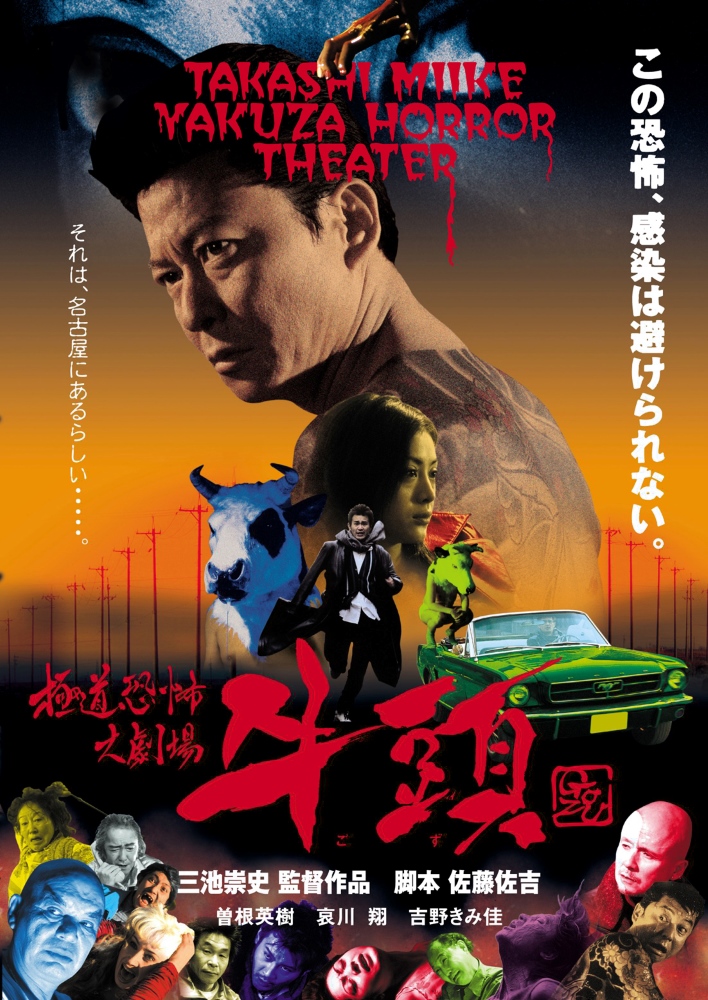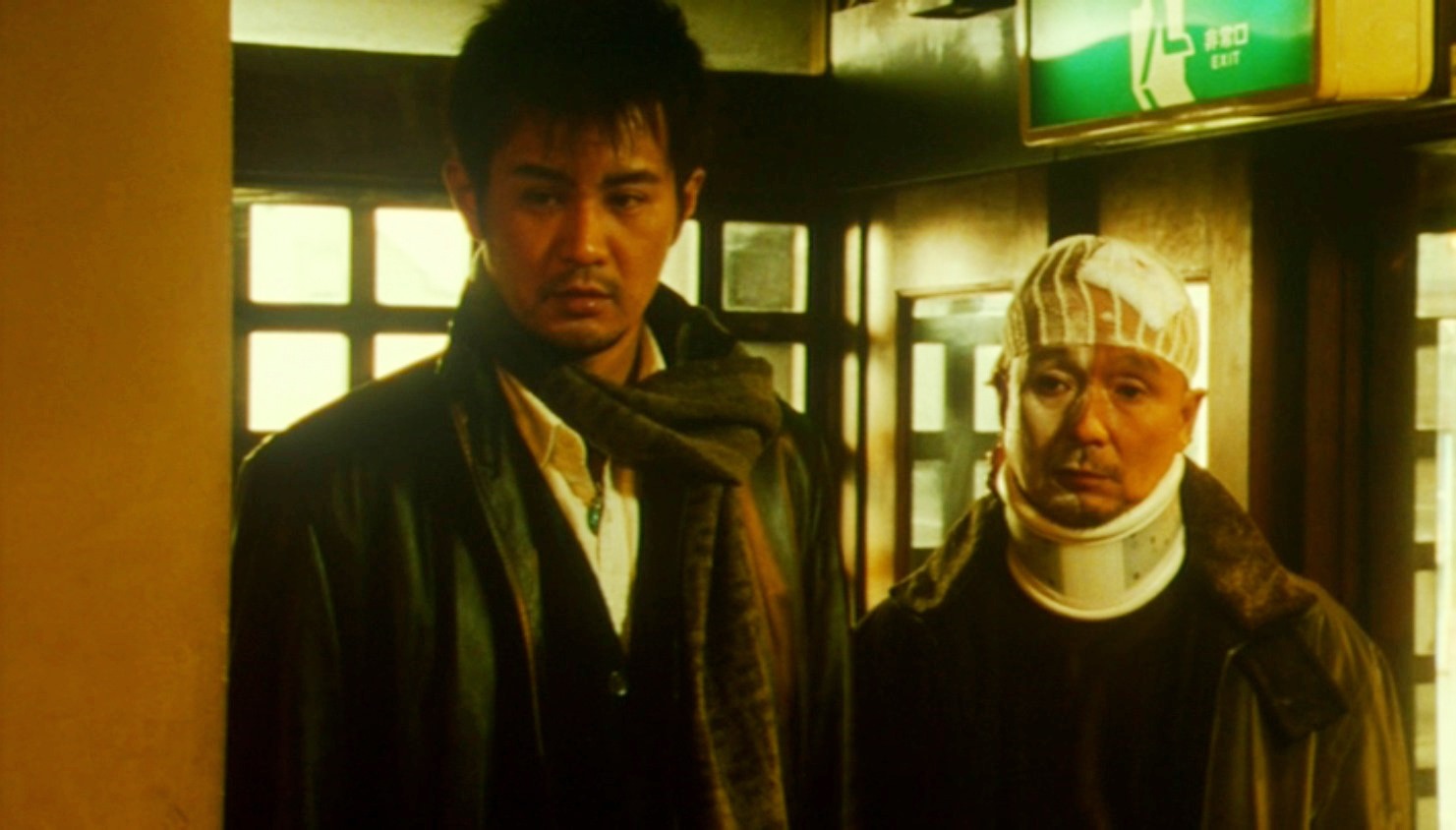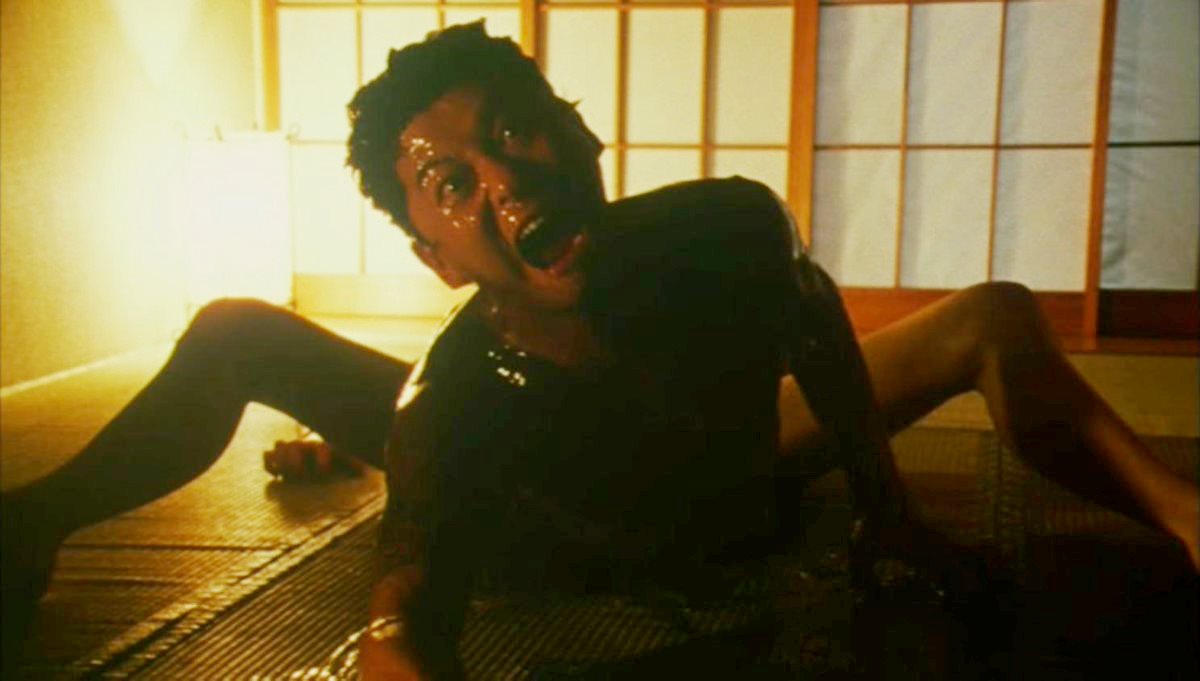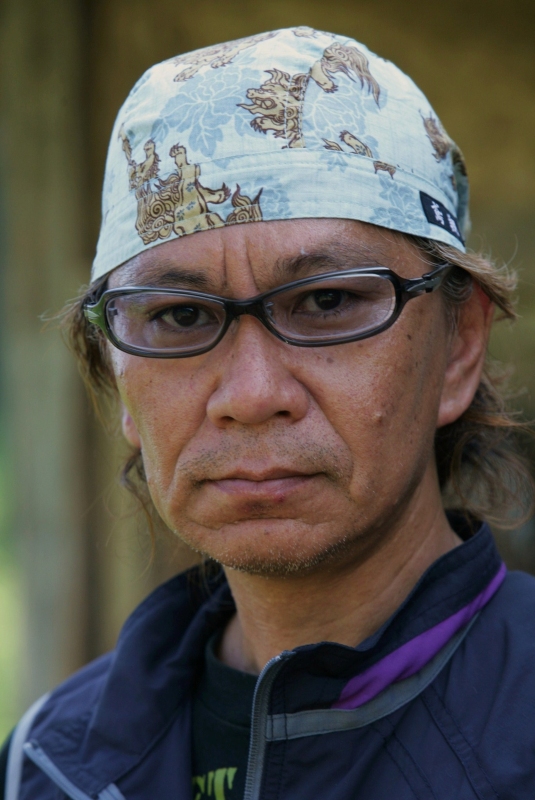
(Gokudo Kyofu Dai-Gekijo: Gozu)
Japan. 2003.
Crew
Director – Takashi Miike, Screenplay – Sakichi Sato, Producers – Kanako Koido & Harumi Sone, Photography – Kazunari Tanaka, Music – Koji Endo, Makeup Effects – Yuichi Matsui, Production Design – Akira Ishige. Production Company – Klock Worx Co.
Cast
Hideki Sone (Minami), Sho Aikawa (Ozaki), Kimika Yoshino (Female Ozaki), Shohei Hino (Nose), Renji Ishibashi (Boss Azamawara), Keiko Tomita (Innkeeper), Harumi Sone (Kazu)
Plot
The Yakuza enforcer Ozaki starts behaving strangely in front of his boss and then kills a chihuahua on the street, believing it is a Yakuza attack dog. His younger brother Minami is given orders to drive Ozaki to a junkyard in Nagoya where they plan to eliminate him. After Minami makes a stop en route, he returns to the car to find Ozaki missing. He searches everywhere for him, following the trail that Ozaki has left around the town. During the course of this, Minami comes up against the very strange people of Nagoya. He finally receives a note asking him to meet Ozaki at the junkyard, only to find when he arrives that Ozaki has been killed in the junk compactor. He then meets a woman who claims that she is Ozaki and seems to have all the memories that his brother did.
Takashi Miike is an extraordinarily prolific director with some ninety films to his name since he first appeared in the 1990s. Miike has demonstrated a unique ability to dabble in most genres – everything from horror to musicals, documentaries, fantasy, teen films, science-fiction, Westerns and superheroes, although he has proven most prolific in the Yakuza genre. The films that gained Takashi Miike a cult following were Audition (1999), Ichi the Killer (2001) and Visitor Q (2001), works that pushed an extreme in terms of on-screen sadism, violence, perversion and the downright demented.
Gozu was made just at the point when Takashi Miike had started to be claimed as a cult figure in the West. You could say it came right on the dividing line between the films where Miike went for broke and set out to cause outrage and those that were made subsequently when Miike knew he had an audience and was determined to indulge himself, resulting in some outlandish experiments. These latter have included the likes of the incomprehensible sf/gay prison love story Big Bang Love, Juvenile A (2006), the Japanese Western Sukiyaki Django Western (2007), God’s Puzzle (2008) and the madcap YatterMan (2009), a live-action adaptation of an anime tv series.
Gozu is very much Miike playing into this newfound cult audience and delivering what everyone expects of him – the weird and the bizarre. At the outset, this could easily be another of Miike’s Yakuza films – indeed, the presence of Sho Aikawa, the mainstay of the Dead or Alive series, immediately places Gozu into the same territory. The film has a 150-minute running time and much of it leaves you scratching your head wondering what is going on and where Miike is taking everything. For instance, when we are first introduced to Sho Aikawa in the midst of a Yakuza meeting in a restaurant, he rushes outside and kills the chihuahua of a couple on the street, insisting that it has been trained to attack Yakuza.

There is no particular dramatic momentum to the main part of the story, just Hideki Sone encountering increasingly stranger things going on around the town in his search for his missing brother – a teahouse where one of the patrons repeats the same conversation over and over wondering whether it was hotter today or yesterday, while the waiter that serves them is a man in woman’s clothing and the soup that they insist on offering Hideki Sone is poisoned; Sone makes a phone call to his Yakuza boss (Renji Ishibashi) who answers it in the midst of humping a girl while he has the handle of a ladle impaled up his ass; Sone takes a bath at the guest house, only to be interrupted by the middle-aged innkeeper (Keiko Tomita) coming in and trying to offer him some of her breastmilk (later we see the innkeeper and her brother have an operation that involves bottling her breastmilk for sale).
Things become increasingly more outlandish and surreal. There is the blackly funny scene where the innkeeper says that her brother (Harumi Sone) can talk to spirits and will locate the missing Sho Aikawa and so starts beating Harumi with a riding crop to force the powers to come out at the same time as he runs around the room crying that he does not have any abilities. Or the visit to the store owner’s American wife who speaks bad Japanese before we see that she has every answer to the questions that Hideki Sone has been asking written up on the wall; and the dreams of a man in his underwear in the bedroom with the head of a cow that comes up and licks Sone’s face.
So far we have a film that feels like Coen Brothers in slow-motion – with the same blackly deadpan background characters but taking place at half the speed – while what happens is mildly surreal but nothing that actually enters into genre territory. This does an abrupt change about the 90-minute point where Hideki Sone goes to the junkyard to find his brother only to learn that he has been crushed in a metal compactor. He then returns to his open-top coupe and meets a beautiful girl (Kimika Yoshino) waiting there who insists that she is the missing brother and seems to have all the intimate memories that back this up. At this point, it feels as though Takashi Miike is giving us a gender-swapping variant on David Lynch’s Lost Highway (1997), which had Bill Pullman inexplicably turned into Balthazar Getty halfway through the film.

This is about the point that Gozu started to get interestingly twisted. [PLOT SPOILERS]. Hideki Sone goes to a hotel with his brother/sister but starts to feel sexual desire for her. She takes no particular objection to this and urges him to lose his virginity. Upon starting to undress her as she sleeps, he hears voices coming from her vagina. He takes her back to the city where she insists on going to meet the Yakuza boss, pretending to be the daughter of a late associate whereupon the boss takes her to his place ostensibly for her new job and sets out to bed her. Having sex involves the boss reaching for his collection of ladles to work up his ass in order to get erect – only for Hideki Sone to burst in through the window to rescue his sister, the boss to fall and be impaled on his ladle whereupon Sone touches the ends of an electric lamp to the stub of the ladle to fry the boss.
Things become even more bizarre after that. Hideki Sone decides to take up Kimika Yoshino’s offer to have sex. Our minds are trying to twist around the idea of a guy having sex with a woman who is really his brother – a mix of gender-bending incest that may actually be a new fetish in search of a name. However, as soon as he gets inside her, he discovers that his dick is stuck and he is unable to pull out, resulting in the bizarre image of him crawling across the floor, dragging her attached body with him. He finally manages to wrench himself out, only for a hand to push its way out of her vagina, followed by brother Sho Aikawa rebirthing himself from her womb. The last image is of the two brothers and Kimika Yoshino happily walking down the street arm in arm.
Trailer here
